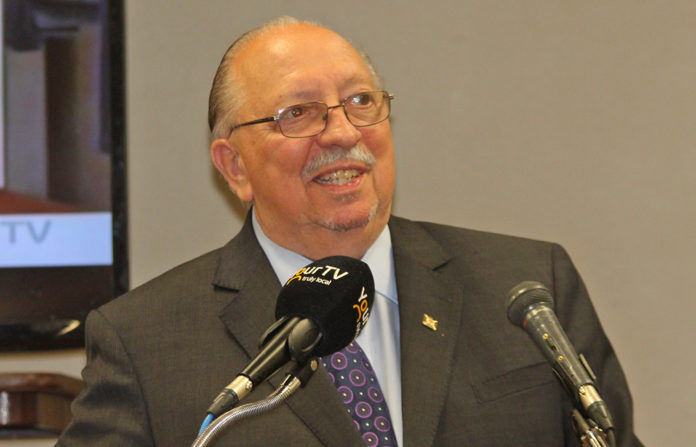Blake Ellis/Local Journalism Initiative
The announcement of a $245 million Diageo whiskey distillery in St. Clair Township, a $12 million investment for a withdrawal management facility in Sarnia, a commitment to twin 7.5 kilometres of Highway 40 from Indian Road to Wellington Street were just some of the successes Sarnia-Lambton MPP Bob Bailey is touted in 2022.
Bailey took the time to reflect on the past year and looked to the challenges 2023 might present.
All three project announcements were made before the provincial election in June. Bailey said the withdrawal management project is still in the planning and engineering stage. When the project was announced, it was estimated it would take two years before shovels were in the ground. The announcement came after local politicians advocated for a withdrawal management centre for over a decade and put up money from the County of Lambton for the building.
It’s not clear when it will open.
The twinning of Highway 40 between Modeland Road and Wellington Street – which has been a local priority for 37 years – is still a number of at least two years before the province starts looking for a contractor. That’s how long it will take to complete a preliminary design and class environmental assessment study, which was started by the province at a cost of $2.65 million. Ministry of Transportation completed a preliminary design study in 2004 and pegged the cost then at $80 million.
And Diageo is still in the planning stages of the Crown Royal distillery which is not expected to be fully operational until 2025.
The construction of the distillery, which will bring jobs to the area, will likely put a further squeeze on the housing market. Bailey says the government wants to see more than 100,000 homes built annually across the province over the next 10 years. This is why Bill 23, More Homes Built Faster Act, was passed, which is hoped will speed up the process of building homes at the development stages.
Bailey said this is why the Strong Mayors Act was also passed, giving more powers to the mayor in Ontario’s two largest cities, Toronto and Ottawa. In the case where the council is slowing a process for political reasons, there is a mechanism for the mayor to override the process. Bailey said Toronto Mayor John Tory welcomed the changes while Ottawa Mayor Mark Sutcliffe said he won’t use his new powers. “The Ottawa mayor might find out he might need it,” said Bailey.
The bill was widely criticized by municipal leaders, with former Lambton Warden Bill Weber noting it was “the end of democracy” when a mayor could overrule the will of the majority.
Politicians were also concerned giving the powers to large city mayors was only the beginning. Bailey says if cities like London or Windsor can show they need it, the provincial government could look at it.
While the Ford government makes some big changes at the municipal level, small municipalities in Lambton voice concern about the possibility merging more local governments. Bailey hasn’t heard any of this talk, saying he would not like to see any forced amalgamations, but if a municipality feels it would be beneficial, it is up to them.
The province’s health care system has also been under scrutiny this fall. Dozens of hospitals have closed emergency rooms because of lack of staff.
Larger hospitals cancelled some elective surgery in the late fall because the hospitals were full of children with COVID-19, RSV and the flu. The problems were compounded by the lack of medications on pharmacy shelves for children.
Bailey said a lot of the problem is Canada is relying on foreign markets to produce many of these medications. He would like to see more being produced in Canada, or even in North America.






